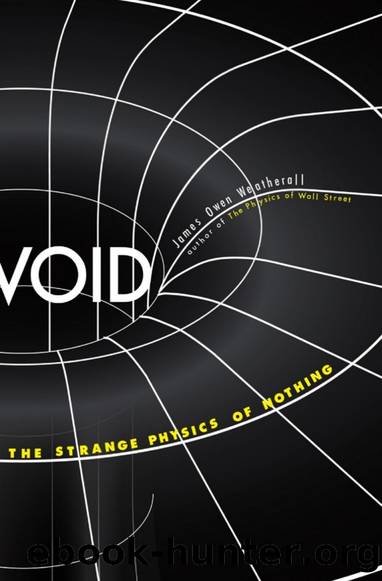Void: The Strange Physics of Nothing by James Owen Weatherall

Author:James Owen Weatherall [Weatherall, James Owen]
Language: eng
Format: epub
ISBN: 9780300224498
Google: x6FTDQAAQBAJ
Goodreads: 32887719
Publisher: Yale University Press
Published: 2017-01-08T06:00:00+00:00
In a classical theory, where the states of affairs consist in definite objects occupying definite positions and moving with definite velocities in space or space-time, it is clear what it would mean to say that space-time does not have any stuff in it. (Of course, we also saw in the last chapter that in general relativity, even universes that are empty in this sense can be so richly structured that itâs hard to say they are empty, full stop. But we will leave that aside for now.) In quantum physics, however, things are less clear. The states are more abstract representations of reality, and the route from a state to physical quantities or measurement is inherently probabilistic. So what would it mean to say that there are no bodies at all?159
The answer, at least in quantum field theory, is that the number of particles in some region of space and time (or the universe as a whole) should itself be considered a physical quantityâand indeed, one that should be an âobservableâ in both the technical sense and the ordinary sense of the sort of thing we could, in principle, measure by building a particle detector and counting up clicks.160 So, given a state, the theory allows us to ask, âHow many particles are there?â by asking what the probability is that we would find one particle, or two particles, or three, and so on, if we set up an appropriate experiment. In this way, we can calculate the âaverageâ number of particles that we should expect to find if we performed many similar experiments.
Just as with the other observables described above, however, the probabilities we get from this particle-number observable are generally not (just) a reflection of our ignorance. In other words, the theory does not yield probabilities merely because we do not know how many particles there areâeven though there are, in any given region of the universe, or in the universe as a whole, some fixed number of particles. Not at all. Instead, generic states in quantum field theory are ones in which there simply is no fact of the matter about whether there are any particles in a given region at a given time, or even in the whole universe for all of eternity. It is only once we make a âmeasurementâ that we get some sort of determinate number of particles in a region. (Though, of course, the measurement problem still rears up.)
What I just said is true for generic states: that is, except for very special cases, quantum states are going to be ones in which there is some probability of finding any number of particles. But there are exceptions: one can find states that are such that it is certain that there is exactly one particle in the universe, or exactly two, and so on. There are even states in which it is absolutely certain that there are no particles in the whole universe. These special states are known as vacuum states.
Vacuum states are
Download
This site does not store any files on its server. We only index and link to content provided by other sites. Please contact the content providers to delete copyright contents if any and email us, we'll remove relevant links or contents immediately.
The Complete Stick Figure Physics Tutorials by Allen Sarah(7373)
Secrets of Antigravity Propulsion: Tesla, UFOs, and Classified Aerospace Technology by Ph.D. Paul A. Laviolette(5372)
Thing Explainer by Randall Munroe(3941)
The River of Consciousness by Oliver Sacks(3606)
The Order of Time by Carlo Rovelli(3195)
How To by Randall Munroe(3118)
A Brief History of Time by Stephen Hawking(3026)
I Live in the Future & Here's How It Works by Nick Bilton(3001)
What If?: Serious Scientific Answers to Absurd Hypothetical Questions by Randall Munroe(2705)
The Great Unknown by Marcus du Sautoy(2695)
Midnight in Chernobyl by Adam Higginbotham(2550)
Blockchain: Ultimate Step By Step Guide To Understanding Blockchain Technology, Bitcoin Creation, and the future of Money (Novice to Expert) by Keizer Söze(2496)
Networks: An Introduction by Newman Mark(2407)
The Meaning of it All by Richard Feynman(2356)
Easy Electronics by Charles Platt(2334)
The Tao of Physics by Fritjof Capra(2276)
Midnight in Chernobyl: The Untold Story of the World's Greatest Nuclear Disaster by Adam Higginbotham(2238)
Introducing Relativity by Bruce Bassett(2125)
When by Daniel H Pink(2118)
